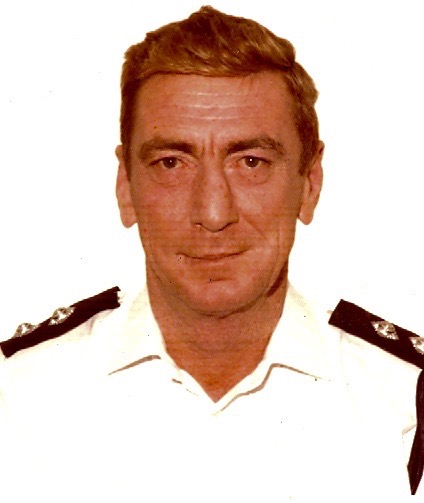
Douglas Noel “Red” Hebberd was born on 24th December, 1926 in Basra, Iraq, the son of Edward St. John and Isobel Nancy Hebberd.
His father was Manager at the Basra station for the Iraq Petroleum Company and had been born in India where his father had worked for the Indian Civil Service. Edward St. John Hebberd had joined the Oxfordshire and Buckinghamshire Light Infantry in India and was posted with his battalion to Mesopotamia in World War 1, attaining the rank of Captain. He was wounded in the Battle of Ctesiphon and was sent back to India to recover.
Upon his return to Iraq, he was seconded to the Iraq Levies whose function was to relieve British and Indian troops in Iraq. Part of the function of the Levies was the protection of the Assyrian refugee camps in Northern Iraq. It was at one of these camps that he met his future wife, an Assyrian who had fled her home in the Hakkari District of eastern Turkey in the face of the ethnic purge of Assyrians and Armenians in World War 1.
Upon marriage, he resigned his commission and, with no real attachment to England and no desire to return to India, he decided to remain in Iraq, living in Baghdad and then Basra where "Red" was born.
At the age of about six, with a lack of good schools in Basra, "Red" and his brother Dick were sent to England and he spent 10 years boarding at the King Edward VI Grammar School in Totnes, Devon. Many years later "Red" told his family here in Bermuda that whilst he attended school he could recall old boys returning for visits and they would always be treated like Royalty. He always spoke of this and dreamed of going back to visit. He finally did so ib 1977, but unbeknown to him the school had become a comprehensive, and no-one was interested in the fact that he had been there almost 50 years before. He was really devastated!
At the age of 16, and to avoid, as he used to put it, “doing his “O” levels”, "Red" left school and became an officer cadet with the British Tanker Company. He spent several years on hi-octane tankers doing the North Atlantic and Far East runs and at one point was in a convoy that formed off Bermuda, his eventual home.
When the war ended, he left the Merchant Marine after having received the first four of his seven medals of which he was extremely proud – the 1939 – 1945 Star, the Atlantic Star, the Burma Star and the War Medal 1939 - 1945.
He then applied to join the Kent Constabulary but was refused as he was a ¼” too short. His father by then had been posted to Haifa, in then Palestine, and Red joined the Palestine Police, Marine Division. He was then near with his parents and three sisters for the first time in many years.
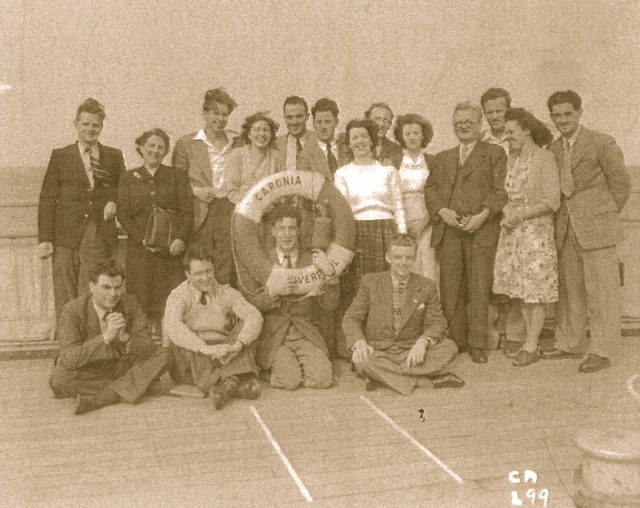
When the British Mandate of Palestine ended with the formation of Israel in 1948, officers were given the choice of other posts in the British Empire. Red chose to come to Bermuda. He was one of the contingent of former Palestine Police Officers who sailed on the Cunard White Star Shipping line’s “Caronia” from Southampton, England, arriving in Bermuda either in late January or early February 1949.* His companions included "Sandy" Saunders, Desmond Crafter, John W. Steel, Joe Mercer, John ‘Susy’ O’Connor, John Raymond Monk, Charles John Aitken, Barry Ivor Elliott and John Ivor Elliott (cousins), William Arthur McGrath, Edgar William Talbot, Michael Joseph Troy, E.J. Lewis and a man named Gibbs (CLICK HERE for more information on the Palestine Police group from the recollections of Joe Mercer who served in the Bermuda Police briefly from 1949-1950)"
* It is believed the Caronia arrived in Bermuda on 22nd January 1949, and that the officers were officially sworn in on 4th February 1949.
"Red" arrived on Island at a time when there was very little, if any real training for new police officers. On arrival he and his fellow recruits would likely have spent a few days in Hamilton Police Station where they would read through a set of law books and were given some very basic notes to read about such topics as how to make an arrest, how to deal with dangerous dogs ... and notes of the general duties of constables and the structure of the Police Force. "Red" was then assigned to beat duties in the City.
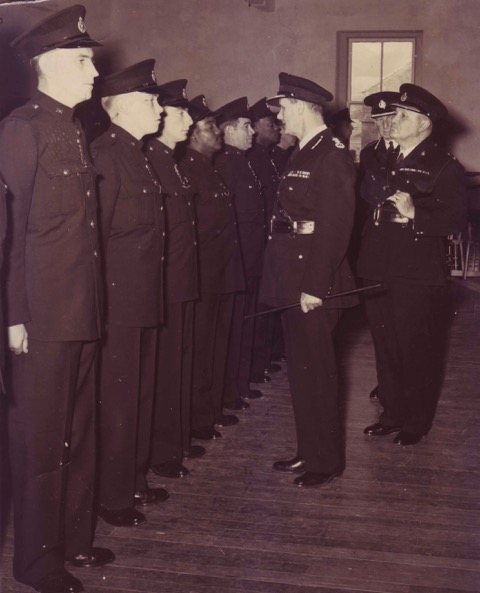
One of the primary duties of beat constables in Hamilton was to direct traffic at Heyl's Corner. The photo below shows young P.C. Hebberd on duty directing "traffic" while answering questions from two tourists on pedal cycles. The street is not exactly bustling with vehicles! At the time this photo was taken the No 1 Shed was still standing (visible on the right with a Custome officer standing guard) and was in use as a storage area when goods arrived in the port. The photo itself was likely taken for advertising purposes in North America. We have recently been informed that when they were not directing traffic, the officers on duty were required to patrol the southern side of Front Street and was not permitted to seek shade under the verendahs on the northern side of the street. Some years later the "birdcage", designed by then City Engineer, Geoffrey Bird, was provided for constables to use and this was fitted with a cover to provide protection from the sun and rain.
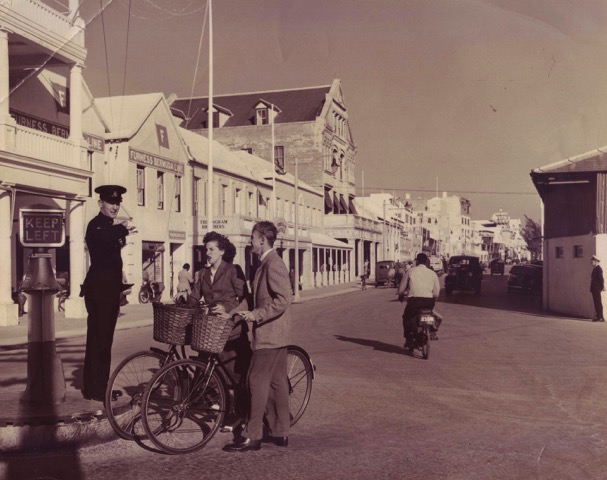
Red's son, Peter, recalls his father telling his children that when he and Kitty got engaged in 1952, Kitty was sent off to choose her own engagement ring. When she found what she wanted she tracked down "Red", who was directing traffic on Heyl's Corner, and obtained his approval for her choice right there and then!
As mentioned earlier, formal training for new police officers was minimal at best, but the need for a proper training programme was being recgnized by the Police Force, and several Training Courses were held in the 1950's using experienced instructors from the U.K. The photo below shows a course held in 1955, using the services of Mr. E. Barker who was the Training Officer for the Lancashire County Constabulary. P.C. "Red" Hebberd attended this course and can be seen on the top row, 2nd from the left.
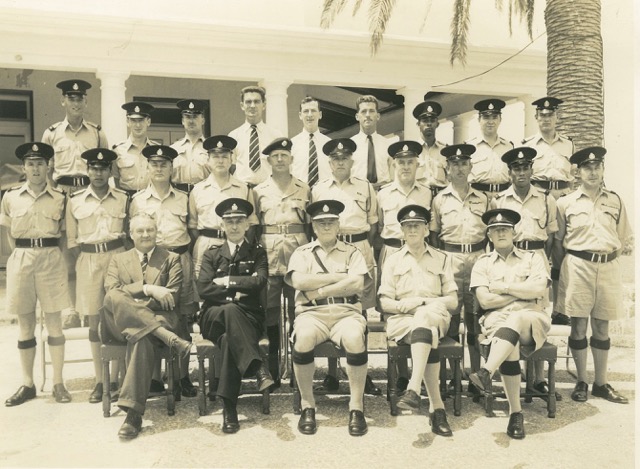
Young P.C. Hebberd must have benefited from this course because he was promoted to Sergeant the following year on 1st December 1956. This second photograph also appears to have been taken during a Training Course, and "Red" is now sitting on the front row, possibly as a new instructor or trainee instructor.
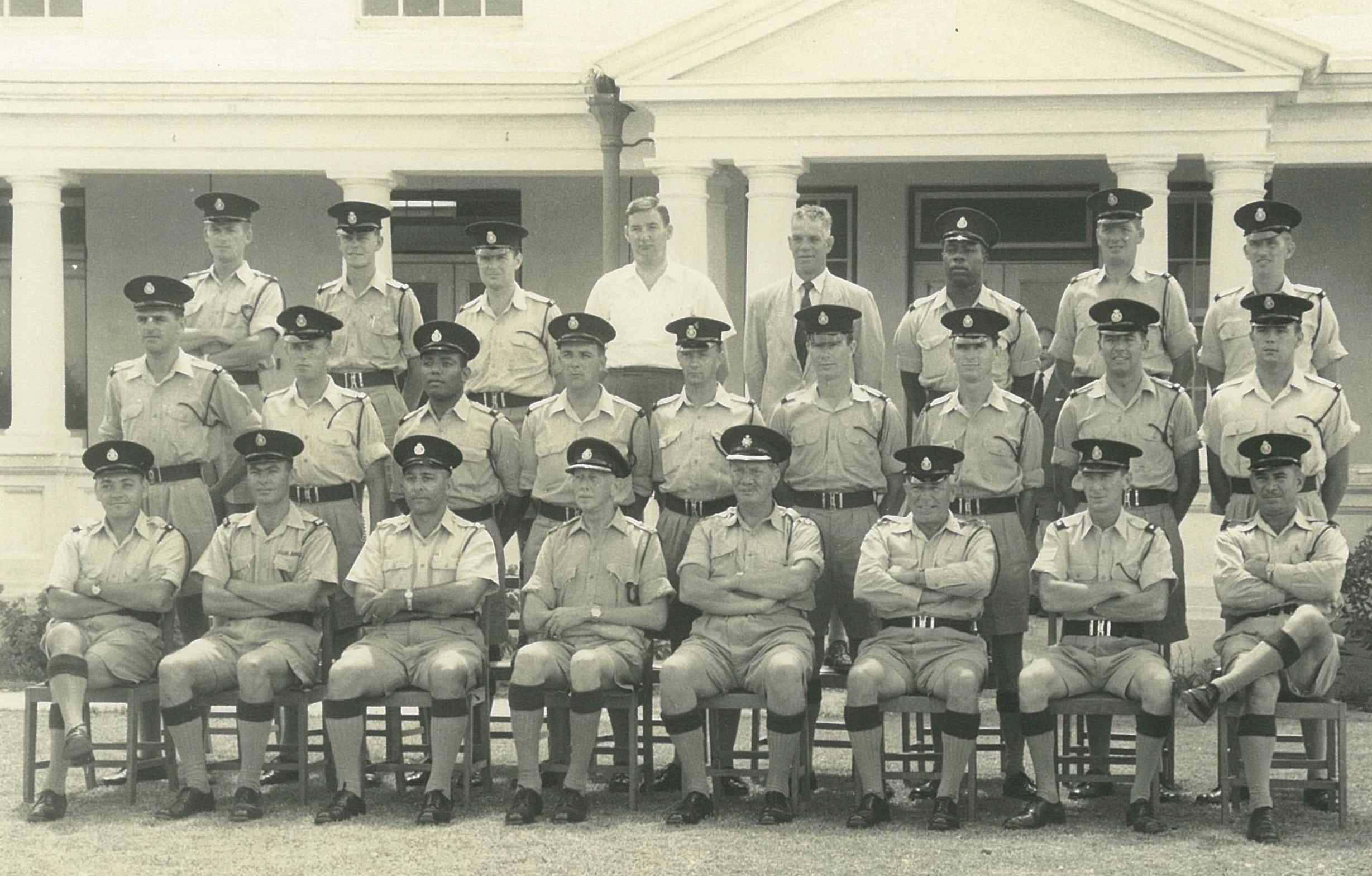
By 1958 Sergeant Hebberd was the instructor for a Refresher Course held at the Police Headquarters, Prospect. We don't have the best of records of these refresher courses so we have no way of knowing how many were held or who attended them, but by this time those men recruited in the U.K were being sent on a 3 month Basic Training Course held at Mill Meece in North Staffordshire prior to arriving in Bermuda. It was not until 1962 that the Island had it's own Police Training School headed by Inspector Roy Chandler who had been a training instructor in the Cheshire Police.
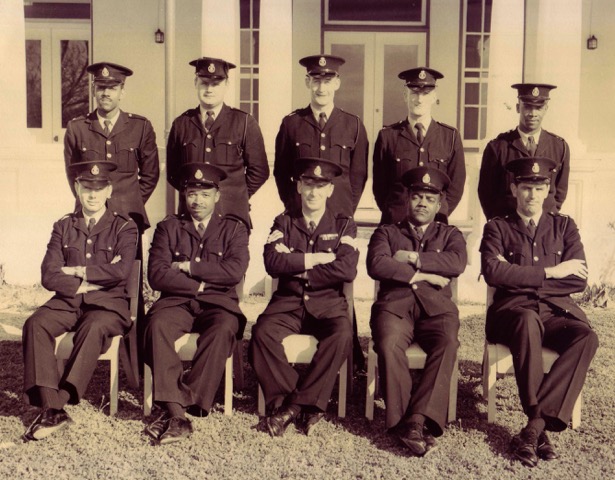
Always a very sociable person, "Red" was an active member of the Palestine Police Old Comrades Association, and a keen member of the Officers Mess etc etc.
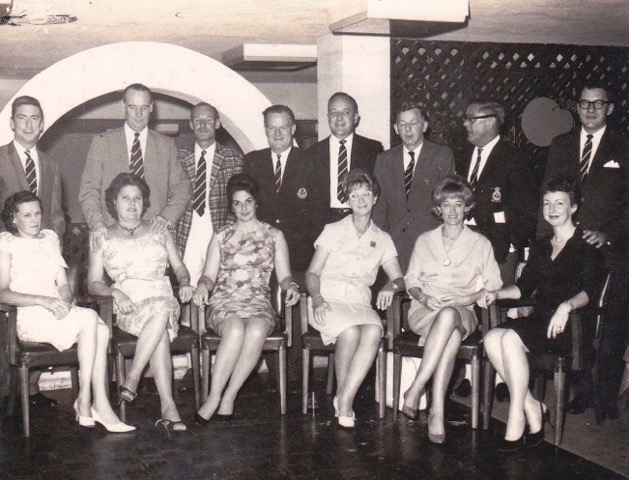
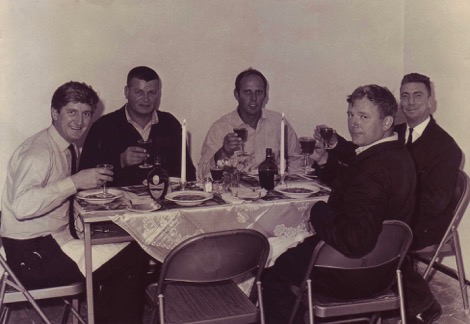
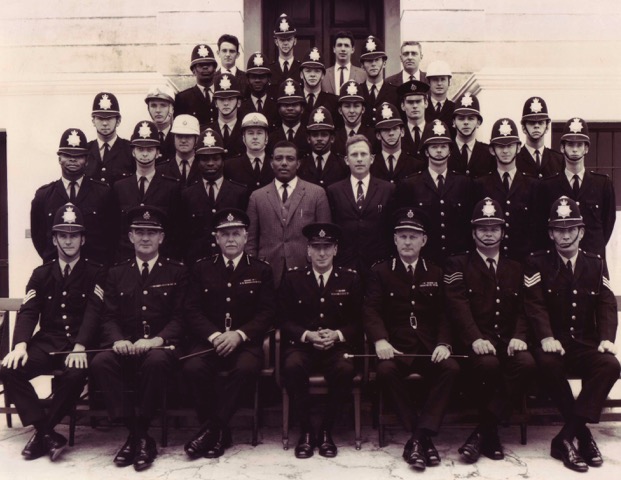
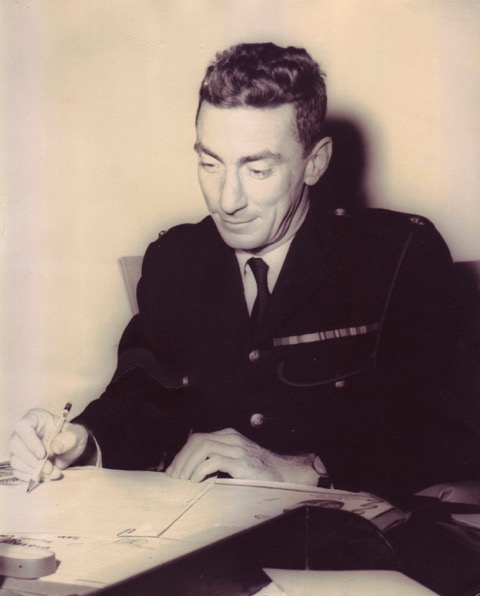
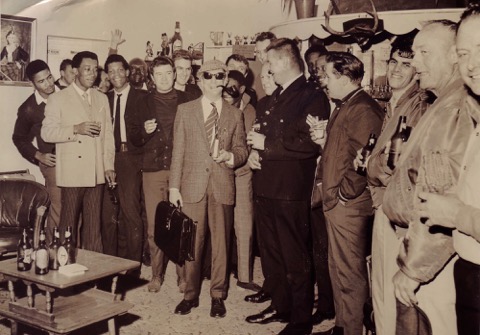
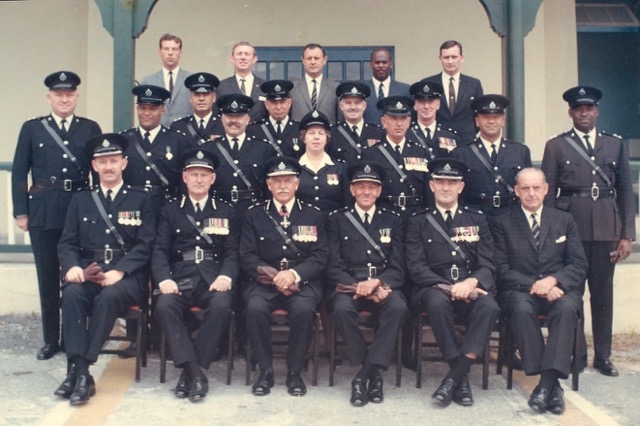
In 1975, "Red" was seconded to the Royal Turks & Caicos Police Force during a difficult time of unrest, and was commended by the Commissioner for his actions in dealing with a violent man.
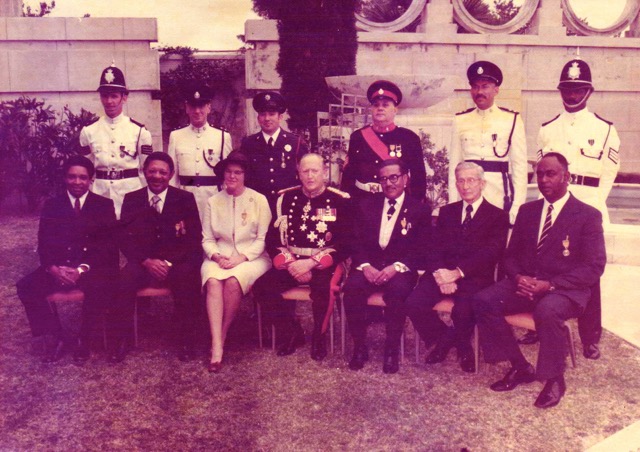
STANDING, L to R: Sgt. Michael Burke, (Police); Insp. Douglas "Red" Hebberd, (Police);
Sgt. Moniz, (Fire Brigade); Sgt. Perry, (Bda. Regiment);
Insp. Gladwin "Doc" Hall, (Police); Sgt. Jerry James, (Police).
SEATED, L to R: Sgt. Dudley Proctor, (Police): Sgt. Charles "Bongo" Williams, (Police);
Mrs. Parker, (Police Civilian Staff); H. E. Governor Sir Edwin Leather;
Dickie Drew, (Wellington Rovers Softball & Soccer) ;
R. Cooper, (ex- Bda. Customs and Bda. Regiment); Gladstone Bassett, (Post Office).
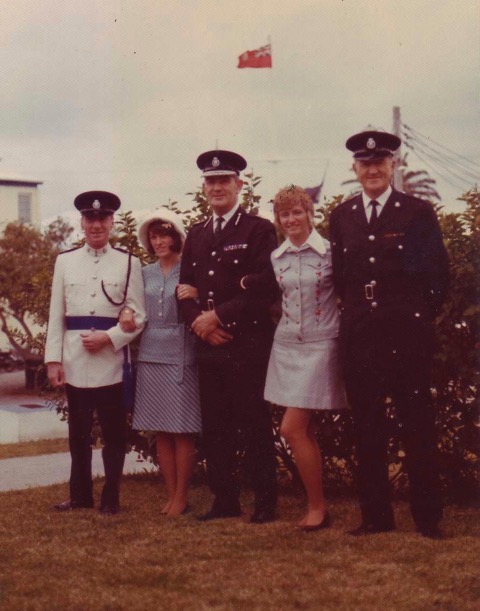
"Red" retired from the Bermuda Police in 1979 after 33 years 11 days of Police Service.
After retirement from the Police Force, he worked for many years at Gorham’s. He also bought his dream boat called "Pipe Dream on which he Joan, and the family spent many weekends. He had always had a boat of some description and Pipe Dream was his special retirement present to himself!
He retired form Gorham’s. His son Peter recalls that one day, when he was then working at Bluck’s they needed an emergency van driver to do deliveries. He says, My dad came to help out for a day and then happily did deliveries for several years until he then gave up work for good. His first wife Kitty, had worked at Bluck’s from 1935 until she died in 1970. Talk about continuing a family tradition!"
There must be hundreds of our former colleagues who can remember that "Red" and his family lived at 'Camp Lodge', the house directly opposite Police Headquarters at Prospect from 1960-1979.
"Red" died on 31st October 1994 and was survived by his second wife, Joan, and three of his children, Elizabeth Moore, Dorothy Fogden and Peter Hebberd.
Medals Awarded to Douglas "Red" Hebberd
The 1939–45 Star was a campaign medal of the British Commonwealth, awarded for service in the Second World War. The medal was awarded for operational service between 3 September 1939 and 2 September 1945.
The Atlantic Star was a campaign medal of the British Commonwealth, awarded for service in World War II. The star was awarded for six months service afloat, in the Atlantic or in Home Waters, within the period 3 September 1939 to 8 May 1945. Merchant seaman also qualified for the medal. They were required to have served in the Atlantic home waters, North Russia Convoys or South Atlantic waters.
The Burma Star was a campaign medal of the British Commonwealth, awarded for service in World War II. Royal Navy and Merchant Navy personnel qualified through service in an area restricted to the Bay of Bengal, and enclosed by a line running from the southern-most point of Ceylon for a distance of 300 miles south, then to a point 300 miles west of the southern-most point of Sumatra, and continuing east to the western side of the Sunda Strait, including the Strait of Malacca. The 6 months service for the 1939-1945 Star had to be earned, before service could count towards the Burma Star.
The War Medal 1939–1945 awarded to those who had served in the British Armed Forces or Merchant Navy full-time for at least 28 days between 3 September 1939 and 2 September 1945. In the Merchant Navy, the 28 days must have been served at sea. It is sometimes described as the "Victory Medal" for World War II, although that is not its correct name.
The General Service Medal 1918 - 1962 – Palestine Police was instituted to recognise service in minor Army and Air Force operations for which no separate medal was intended. Part of the resolution of the 1936-9 Arab Revolt in Palestine was the imposition of an immigration quota for Jews wishing to enter Palestine. This was opposed by the Jewish settlers in Palestine and in 1940, a guerrilla war was launched against the British forces there. While service in this conflict prior to 1945 is counted as World War Two service, service between 27 September 1945 and 30 June 1948 is acknowledged by this clasp to the GSM.
Shortly after his arrival in Bermuda Red received his fifth medal, the Colonial Police Forces Medal for Meritorious Service – Palestine Police.
The Colonial Police Forces Medal for Meritorious Service – Bermuda - Awarded by the Queen in the early 1960’s.
The Colonial Police Forces Medal for Long Service and Good Conduct - First clasp awarded after 18 years service and the second class after 25 years service.